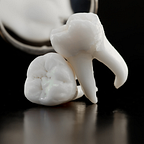10 Wisdom Teeth Facts You Should Know
Having a well-rounded dental care plan is important for your overall oral health, and it’s something that you should take care of yourself. Here are ten quick wisdom teeth facts that could help you out on your journey to good oral health:
1. Wisdom teeth typically emerge between 12 and 18 months but can come as early as eight weeks.
2. There are usually four wisdom teeth in every human jaw — two on the bottom and two on the top.
3. If left untreated, wisdom teeth can cause pain and difficulty chewing and swallowing.
4. When wisdom teeth erupt, they can touch or even poke through the gum line. This can lead to infection and even further pain or damage to the tooth.
5. Early treatment of wisdom teeth is key for preventing these issues from occurring in the first place.
6. If left untreated, a wisdom tooth can eventually fall out — an event known as a “wisdom tooth extraction”.
7. A properly fitted denture will provide long-term relief from problems caused by a wisdom tooth’s presence — including pain, difficulty chewing and swallowing, and decreased hygiene ability.
8. If you’re experiencing any of these problems, speak with your dentist.
Are there any risks associated with wisdom tooth removal?
Wisdom teeth are typically removed when they become troublesome or interfere with chewing or speaking. But there are some risks associated with wisdom tooth removal, regardless of the technique used.
The most common risk is bleeding. This can occur during the tooth removal process, as well as after the tooth has been removed. If the bleeding is severe, it can lead to infection. In extreme cases, this infection can spread to other parts of the body and even result in death.
Another possible risk is misdiagnosis. If a wisdom tooth is not removed properly, it can become embedded in the jawbone and require surgery to remove. In this situation, the patient could end up with a permanent speech impediment or facial scarring.
So if you are considering wisdom tooth removal, be sure to discuss any risks with your dentist carefully. Also, read about wisdom tooth removal cost.
What happens after wisdom teeth are removed?
After wisdom teeth are removed, the space they occupied in your mouth is filled by either a dental implant or a bridge. This article will focus on dental implants.
Dental implants are devices that are inserted into the jawbone. They look and feel like natural teeth and are usually indistinguishable from them. They are made of titanium and ceramic and are placed below the gumline. The aim of dental implants is to provide a secure foundation for artificial teeth and to provide a permanent solution to problems with dentures, such as clenching and grinding.
There are two types of dental implants: single-tooth and multi-tooth. Single-tooth dental implants consist of one implant supported by a single tooth root. Multi-tooth dental implants consist of multiple implant support posts that can hold up to three teeth each.
After surgery, it is important to take good care of your implant. You should avoid eating hard foods or drinking beverages that contain hard substances for six months following surgery. You should also avoid chewing hard objects, which can damage the implant.
